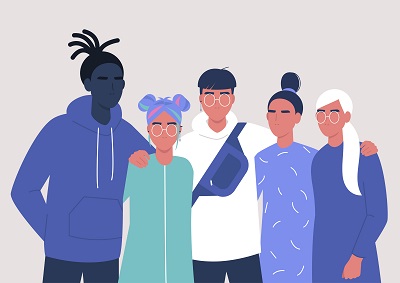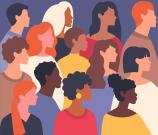Redefine and Unlearn: BIPOC Youth Destigmatize Mental Health in their Community
Redefine and Unlearn: BIPOC Youth Destigmatize Mental Health in their Community

In a world that is constantly evolving, BIPOC youth are actively working to change the way their communities acknowledge and embrace mental health. Youth (defined here as those between the ages of 15 to 24) are redefining what mental health means and are trying to “unlearn” some of the negative stigmas that have been taught or demonstrated by older generations.
Youth of color experience both direct and indirect harm to their mental health and well-being from racialized police violence and immigration enforcement, which can trigger a stress response that can accumulate over time, adding to existing social and cultural harms based on race and ethnicity.1 Add the negative impact on mental health from the pandemic, whether that be stress or loneliness, and there is no surprise that mental health issues among BIPOC youth are increasing.
In 2020, Black and Latiné children were 14 percent less likely than White children to receive treatment for their depression.1 And LGBTQ+ youth from American Indian and Alaskan Native backgrounds were 2.5 times more likely to report a suicide attempt in the same year, compared to their non-Native LGBTQ+ peers.2
Unfortunately, BIPOC youth are no strangers to navigating cultural pressures and generational stigmas passed on from adults; but because of social media, technology, and the vast amount of accessible information at the fingertips of the younger generation, these youth seem more open to discussing and seeking out mental health support than their previous generation. Even though many cultures within the BIPOC community associate weakness with mental health needs, BIPOC youth have found—through exploring social media—that they are not alone in their mental health experience and journey.
It takes a lot of courage and strength to consciously unlearn and destigmatize mental health as a young member of the BIPOC community. Unlearning is defined as the process through which we break down the origins of our thoughts, attitudes, behaviors, feelings, and biases.3 It is a hard process, but it can be extremely powerful and beneficial to mental wellbeing over time. There is not a perfect way to practice the process. Some people work best alone, and others work best with help from a support system or mental health professional. Regardless of who is there, unlearning encourages the change in one’s mindset to move away from "this is the way things are supposed to be" to embracing "this is the way things are".
Today BIPOC youth are beginning to embrace mental health and recognize that everyone experiences in their own unique way, at some point in their life. Instead of being ashamed of their mental health, they are leveraging social media platforms like Twitter and Tik Tok to find other community resources to educate themselves and to also share uncomfortable feelings or experiences.
Once BIPOC youth realize they are not alone in their experiences, they feel less isolated and more open to sharing their own story. Younger people are finding out that there is power in leaning on community members to sort through uncomfortable mental health feelings. Today’s youth continue to lead the charge in leveraging community support and the power of technology and social media to help destigmatize mental health within their communities.
If you are interested in learning more about anxiety and depression and how that can impact mental health, check out ADAA’s resources to help.
Share Your Story and Voice and Help #breakthestigma Around Mental Health.
Support ADAA's Mission - Every Gift Makes an Impact
Footnotes:
- National Black Women's Justice Institute (NBWJI). www.nbwji.org. Contextualizing BIPOC Youth Mental Health.
- The Trevor Project. www.thetrevorproject.org. American Indian/Alaskan Native Youth Suicide Risk.
- Psychology Today. www.psychologytoday.com. The Power of Unlearning.
















